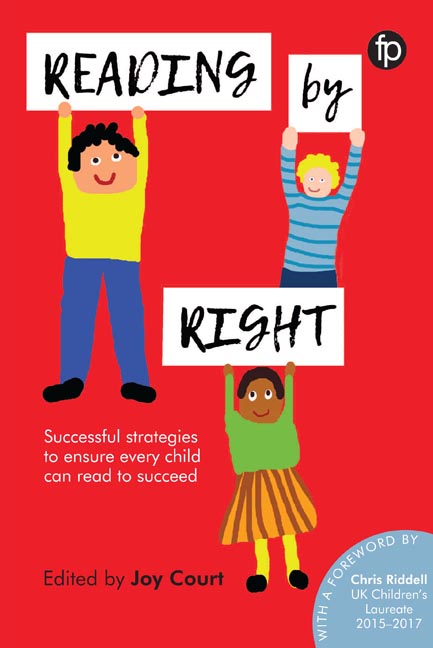Book contents
- Frontmatter
- Dedication
- Contents
- List of figures, boxes, case studies and appendices
- Foreword
- Contributors
- Introduction
- 1 Supporting every child to read
- 2 Listening to their voices: what research tells us about readers
- 3 Becoming a reluctant reader
- 4 Reading Club: a case study from Finland
- 5 Trained reading helpers: Beanstalk's magic ingredient
- 6 Let all children experience the joy of reading: promoting children's reading in Korea
- 7 Reflecting readers: ensuring that no one is excluded
- 8 Pulling in reluctant readers: strategies for school librarians
- 9 Not just for the avid reader: inclusive Carnegie and Kate Greenaway shadowing
- 10 Listen up! How audiobooks support literacy
- 11 Reading the future
- Index
7 - Reflecting readers: ensuring that no one is excluded
Published online by Cambridge University Press: 08 June 2018
- Frontmatter
- Dedication
- Contents
- List of figures, boxes, case studies and appendices
- Foreword
- Contributors
- Introduction
- 1 Supporting every child to read
- 2 Listening to their voices: what research tells us about readers
- 3 Becoming a reluctant reader
- 4 Reading Club: a case study from Finland
- 5 Trained reading helpers: Beanstalk's magic ingredient
- 6 Let all children experience the joy of reading: promoting children's reading in Korea
- 7 Reflecting readers: ensuring that no one is excluded
- 8 Pulling in reluctant readers: strategies for school librarians
- 9 Not just for the avid reader: inclusive Carnegie and Kate Greenaway shadowing
- 10 Listen up! How audiobooks support literacy
- 11 Reading the future
- Index
Summary
The diversity agenda
It often feels that discussion and debate around diversity in children's books and reading is cyclical. Diversity gains focus and momentum at given points, achieving some level of change, but soon dies back, before the process begins again anew. Are there ways that it is possible to achieve and embed change in a more meaningful and long-lasting manner, and what contributions, if any, can libraries make towards furthering this agenda and enriching their own offers and provision through involvement? Similarly, how can we make sure that reading provision through libraries is made in a way that is accessible to people with a wide range of abilities and backgrounds so that everyone feels that reading does indeed reflect their needs and lives?
A diverse readership
Does diversity matter to readers? Unsurprisingly, the answer is a categorical yes! It would be easy to argue that diversity matters most to those library users who fit within or identify with a specific subcategory of diversity, whether that be around gender, sexuality, race, religion, physicality or mental health. The truth is, however, that diversity matters to us all. Diversity is not exclusive, as it might sometimes be construed, but is truly inclusive and involves and affects each one of us. Reflecting diversity in the literature that we produce, promote and read allows it to shine a light on the lives and needs of readers so that it feels a part of rather than apart from this discourse and exchange of ideas.
Why does diversity matter and how does it affect readers of all abilities and ages? In a society where language itself and cultural signifiers such as food and clothing are increasingly influenced by or originate from globalised bases, it seems crucial that education – whether accessed formally or informally, accidentally or as part of an established curriculum – should be equal to the needs of a society whose ideas, reference points and traditions are sourced from manifold and wide bases.
Reading can help to affirm aspects of our identity. When we encounter characters similar to ourselves and ideas that readily match our experiences, a complex process of validation is able to take place. Likewise, reading can help us to empathise with people from a variety of situations, better understanding the circumstances and scenarios they face.
- Type
- Chapter
- Information
- Reading by RightSuccessful strategies to ensure every child can read to succeed, pp. 107 - 126Publisher: FacetPrint publication year: 2017



